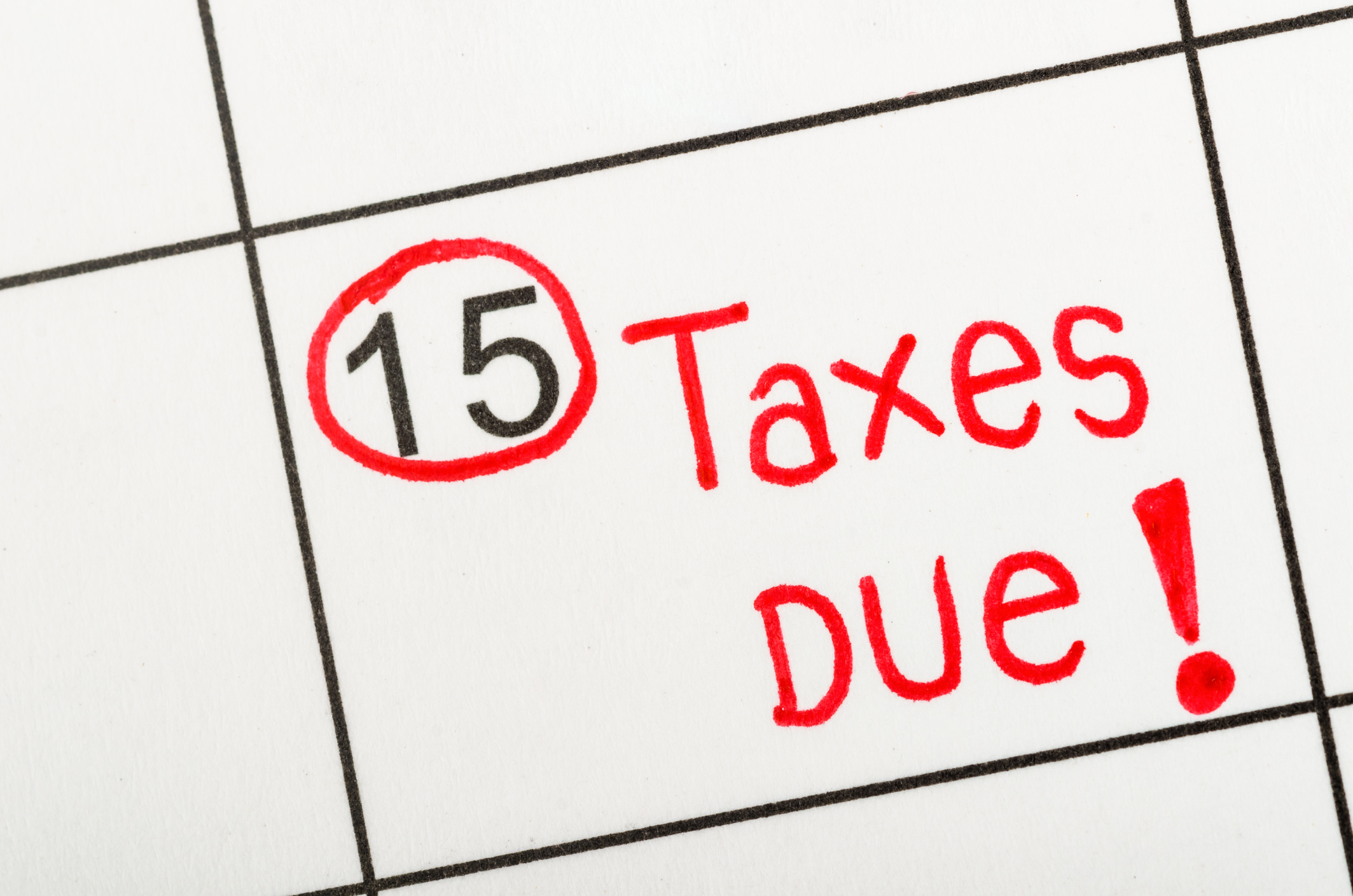Tax Day: When Is the Last Day to File Your Taxes?
Tax Day falls on April 15 this year. However, some people have an extended tax deadline and extra time to file. Are you one of them?

Gabriella Cruz-Martínez

Profit and prosper with the best of Kiplinger's advice on investing, taxes, retirement, personal finance and much more. Delivered daily. Enter your email in the box and click Sign Me Up.
You are now subscribed
Your newsletter sign-up was successful
Want to add more newsletters?

Delivered daily
Kiplinger Today
Profit and prosper with the best of Kiplinger's advice on investing, taxes, retirement, personal finance and much more delivered daily. Smart money moves start here.

Sent five days a week
Kiplinger A Step Ahead
Get practical help to make better financial decisions in your everyday life, from spending to savings on top deals.

Delivered daily
Kiplinger Closing Bell
Get today's biggest financial and investing headlines delivered to your inbox every day the U.S. stock market is open.

Sent twice a week
Kiplinger Adviser Intel
Financial pros across the country share best practices and fresh tactics to preserve and grow your wealth.

Delivered weekly
Kiplinger Tax Tips
Trim your federal and state tax bills with practical tax-planning and tax-cutting strategies.

Sent twice a week
Kiplinger Retirement Tips
Your twice-a-week guide to planning and enjoying a financially secure and richly rewarding retirement

Sent bimonthly.
Kiplinger Adviser Angle
Insights for advisers, wealth managers and other financial professionals.

Sent twice a week
Kiplinger Investing Weekly
Your twice-a-week roundup of promising stocks, funds, companies and industries you should consider, ones you should avoid, and why.

Sent weekly for six weeks
Kiplinger Invest for Retirement
Your step-by-step six-part series on how to invest for retirement, from devising a successful strategy to exactly which investments to choose.
Tax Day — when most taxpayers have to file their federal income tax return for the 2024 tax year — falls on April 15, 2025. However, some taxpayers impacted by storms and natural disasters have more time to file.
Special tax extension rules also apply to Americans living abroad and people serving (or who served) in a combat zone or contingency operation. As a result, they might have more time beyond April 15 to file their federal income tax return and pay whatever tax they are expected to owe. And they could receive an extension past October 15.
In any case, here's what you need to know about when taxes are due.
From just $107.88 $24.99 for Kiplinger Personal Finance
Become a smarter, better informed investor. Subscribe from just $107.88 $24.99, plus get up to 4 Special Issues

Sign up for Kiplinger’s Free Newsletters
Profit and prosper with the best of expert advice on investing, taxes, retirement, personal finance and more - straight to your e-mail.
Profit and prosper with the best of expert advice - straight to your e-mail.
Tax deadline extensions for natural disasters
If the Federal Emergency Management Agency (FEMA) declares a disaster area following a natural disaster, the IRS usually offers tax relief for the disaster victims in the form of tax filing and payment extensions. In the case of certain recent natural disasters, the April 15 tax filing and payment deadline is extended in certain states for individuals and businesses residing or located in the designated disaster areas.
Suppose you were a victim of a natural disaster like the California wildfires. In that case, the IRS recommends you recover your federal and state tax records as soon as possible. Having your tax documents available can serve as proof of income, property ownership, and help you claim expenses that may be subject to federal disaster-related tax deductions or government relief.
Generally, the IRS and state governments allow taxpayers to recover their tax records and other relevant documents for free in the aftermath of a disaster.
Tax Extension: Do you need more time to file?
If, for some reason, you are not able to file your federal tax return on time, you can request an automatic six-month tax extension to October 15, 2025, by filing Form 4868 or making an electronic tax payment. To get an extension, you have to act by the original due date for your return, whether that is April 15, or another extended deadline date.
Keep in mind, however, that an extension to file doesn't extend the time to pay your tax. If you don't pay the tax due by your tax deadline date, then you will owe interest on the unpaid tax and could be looking at additional penalties for filing and paying late.
Deadlines for state tax returns
Unless you live in a state with no income tax, you probably have to file a state tax return as well. Most states synch their income tax return deadline with the federal tax due date. But double check your state deadline to be sure.
State rules regarding tax filing extensions may differ from federal rules. So, check with the state tax agency where you live to find out when your state tax return is due and/or how to get an extension.
Related
- States With IRS Extended Tax Deadlines
- How to Pay the IRS if You Owe
- Tax Season: IRS Changes to Know Before You File
- What's the Standard Deduction?
Profit and prosper with the best of Kiplinger's advice on investing, taxes, retirement, personal finance and much more. Delivered daily. Enter your email in the box and click Sign Me Up.
Rocky Mengle was a Senior Tax Editor for Kiplinger from October 2018 to January 2023 with more than 20 years of experience covering federal and state tax developments. Before coming to Kiplinger, Rocky worked for Wolters Kluwer Tax & Accounting, and Kleinrock Publishing, where he provided breaking news and guidance for CPAs, tax attorneys, and other tax professionals. He has also been quoted as an expert by USA Today, Forbes, U.S. News & World Report, Reuters, Accounting Today, and other media outlets. Rocky holds a law degree from the University of Connecticut and a B.A. in History from Salisbury University.
- Gabriella Cruz-MartínezTax Writer
-
 What to Expect from the January CPI Report
What to Expect from the January CPI ReportThe January CPI report will be released Friday morning. Here's what economists expect the inflation data to show.
-
 How to Open Your Kid's $1,000 Trump Account
How to Open Your Kid's $1,000 Trump AccountTax Breaks Filing income taxes in 2026? You won't want to miss Form 4547 to claim a $1,000 Trump Account for your child.
-
 In Arkansas and Illinois, Groceries Just Got Cheaper, But Not By Much
In Arkansas and Illinois, Groceries Just Got Cheaper, But Not By MuchFood Prices Arkansas and Illinois are the most recent states to repeal sales tax on groceries. Will it really help shoppers with their food bills?
-
 How to Open Your Kid's $1,000 Trump Account
How to Open Your Kid's $1,000 Trump AccountTax Breaks Filing income taxes in 2026? You won't want to miss Form 4547 to claim a $1,000 Trump Account for your child.
-
 In Arkansas and Illinois, Groceries Just Got Cheaper, But Not By Much
In Arkansas and Illinois, Groceries Just Got Cheaper, But Not By MuchFood Prices Arkansas and Illinois are the most recent states to repeal sales tax on groceries. Will it really help shoppers with their food bills?
-
 7 Bad Tax Habits to Kick Right Now
7 Bad Tax Habits to Kick Right NowTax Tips Ditch these seven common habits to sidestep IRS red flags for a smoother, faster 2026 income tax filing.
-
 New Plan Could End Surprise Taxes on Social Security 'Back Pay'
New Plan Could End Surprise Taxes on Social Security 'Back Pay'Social Security Taxes on Social Security benefits are stirring debate again, as recent changes could affect how some retirees file their returns this tax season.
-
 10 Cheapest Places to Live in Colorado
10 Cheapest Places to Live in ColoradoProperty Tax Looking for a cozy cabin near the slopes? These Colorado counties combine reasonable house prices with the state's lowest property tax bills.
-
 New Gambling Tax Rule Impacts Super Bowl 2026 Bets
New Gambling Tax Rule Impacts Super Bowl 2026 BetsTaxable Income When Super Bowl LX hype fades, some fans may be surprised to learn that sports betting tax rules have shifted.
-
 Should You Do Your Own Taxes This Year or Hire a Pro?
Should You Do Your Own Taxes This Year or Hire a Pro?Taxes Doing your own taxes isn’t easy, and hiring a tax pro isn’t cheap. Here’s a guide to help you figure out whether to tackle the job on your own or hire a professional.
-
 Trump $10B IRS Lawsuit Hits an Already Chaotic 2026 Tax Season
Trump $10B IRS Lawsuit Hits an Already Chaotic 2026 Tax SeasonTax Law A new Trump lawsuit and warnings from a tax-industry watchdog point to an IRS under strain, just as millions of taxpayers begin filing their 2025 returns.
